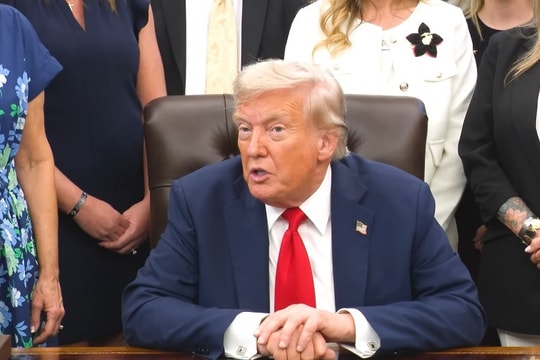Applying business strategy to become president, 'hitting himself in the back with his own petard'
Relying on trusted advisers or threatening opponents are strategies that Trump has successfully applied in business but have backfired in his presidency.
 |
President Donald Trump at a press conference at the White House on April 12. Photo: Washington Post |
As President Donald Trump navigates recent crises, he has adopted strategies from his tumultuous business career: relying on family members and a few trusted advisers, demanding absolute loyalty from those outside his inner circle, threatening to sue opponents and demanding briefs.
Yet the strategies that have worked so well in the marketplace seem to be exacerbating Trump's troubles.
No one in Trump's family has ever worked for the government, and most of his closest advisers have never worked in the White House.
Trump's distaste for lengthy, in-depth analysis has raised concerns that he will not fully digest complex briefings from intelligence agencies and other sources, according to Washington Post columnist Michael Kranish.
Barbara Res, a former vice president at the Trump Organization, said Trump would often come up with some business proposal that was not feasible, but an aide would tell him it was not a good idea. "But it seems like people don't have that kind of pushback at the White House," she said.
Trump's view of Washington politics is shaped by a deep distrust of government authority, dating back to the day the U.S. Justice Department sued him and his father for racial discrimination for not renting apartments to African Americans at a family estate in 1973.
The story about the lawsuit marked Trump's first appearance on the front page of the New York Times, along with his statement calling the allegation "ridiculous." Trump had vowed never to settle the lawsuit, but was ultimately forced to do so. The lawsuit deepened Trump's antipathy toward the administration.
As president, Trump has continued to employ a similar strategy of defiance, only to cave. When judges put a hold on his immigration ban on citizens and refugees from seven Muslim-majority countries, he lashed out at them and vowed to “see you in court,” a tactic he has used throughout his business career. But he eventually abandoned the ban and issued a new one, which was also suspended.
Threat
More recently, Trump’s business strategies appear to have failed him in the Comey firing case. Trump has often used the tactic of warning people that he has been recording their conversations or monitoring their work, then threatening to sue or demand a reduction in the amount owed to contractors.
By suggesting that he secretly recorded his dinner conversation with Comey, Trump appeared to hope to prevent the former FBI director from speaking negatively about him. The White House has refused to confirm or deny the existence of such recordings.
Comey's associates later cited a memo saying Trump had asked Comey to pledge his loyalty but was refused. The White House denied this information.
Not stopping there, Comey's associates also revealed that he wrote a memo about the president asking the former FBI director to stop the investigation into former national security adviser Michael Flynn. Although Trump continued to deny this information, it is clear that with this "threat", Trump was hit back quite strongly.
Over-reliance on legal advice
It took 18 days for Flynn to be fired after acting Attorney General Sally Yates warned White House counsel Donald McGahn that Flynn might be breaking the law by talking privately with the Russian ambassador.
Trump told NBC that "White House counsel Don McGahn spoke to me (about Flynn's contact with the Russian ambassador) but I felt it was not an urgent matter at the time."
A former White House lawyer said McGahn was ineffective and failed to make clear to Trump that the problem was serious. Many questioned McGahn's role, as well as whether he felt comfortable urging Trump to fire Flynn.
McGahn is the nephew of Patrick "Paddy" McGahn, who was Trump's lawyer. During his business career, Trump faced serious financial problems with his Atlantic City casinos and Patrick "Paddy" McGahn played a key role in helping Trump overcome the crisis.
John O'Donnell, the chairman of one of Trump's casinos, told the billionaire that Paddy McGahn was charging too much in legal fees. Trump, however, defended McGahn, explaining that he had a record of winning 13 lawsuits and never losing one.
Paddy McGahn is "one of the few people who is willing to talk to Trump about anything. He's a very good fixer, he's proactive in getting out of trouble before it happens or before it becomes a real problem," O'Donnel said.
A veteran Republican congressman said many were concerned that McGahn, unlike his uncle, was too hesitant to stand up to Trump, leading to ineffective handling of the job.
 |
White House legal adviser Donald McGahn. Photo: Boston Globe |
Difficulty in communication
Trump’s reliance on lawyers has been a hallmark of his business career. Trump’s lawyers have filed hundreds of lawsuits against contractors, business partners, reporters and government agencies. He often combines his lawsuits with incendiary statements to intimidate those he sues.
As US president, Trump continues his offensive style through tweets on social media, but this behavior has caused many concerns within the Republican Party because Trump often makes controversial statements, even contradicting his spokesperson.
According to writer Michael Kranish, Trump has had difficulty breaking away from the corporate-leader style of communication. As a businessman, he often spoke for himself. He gave countless interviews instead of letting a corporate public relations official speak for him.
Meanwhile, as US president, Trump has had to cede much of that role to the White House communications office, which sometimes provides information that is not to his liking or is inaccurate.Trump acknowledged the errors, writing on Twitter: "I work so much and have so much going on that it's hard for my representatives to speak with perfect accuracy." Trump suggested that he might cancel press conferences and instead issue written statements.
But one senior aide said Trump’s history of building his career could help him navigate chaos. After Trump filed for six corporate bankruptcy cases and was $900 million in debt, he rebranded and changed his approach to business. He moved from risky investments to profiting from selling his brand and image.
And then he wrote a book titled: "The Art of Swimming Against the Current".
According to VNE








